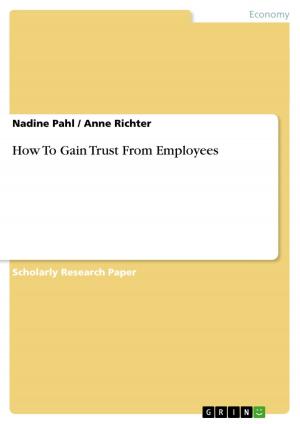Impact of overoptimism and overconfidence on economic behavior: Literature review, measurement methods and empirical evidence
Business & Finance, Management & Leadership, Management| Author: | Andreas Müller | ISBN: | 9783638860628 |
| Publisher: | GRIN Publishing | Publication: | November 16, 2007 |
| Imprint: | GRIN Publishing | Language: | English |
| Author: | Andreas Müller |
| ISBN: | 9783638860628 |
| Publisher: | GRIN Publishing |
| Publication: | November 16, 2007 |
| Imprint: | GRIN Publishing |
| Language: | English |
Diploma Thesis from the year 2007 in the subject Business economics - Business Management, Corporate Governance, grade: 1,3, Otto Beisheim School of Management Vallendar, 58 entries in the bibliography, language: English, abstract: This paper aims to give an overview of two related human traits that have attracted particularly wide interest, namely overconfidence and overoptimism. The two are closely related to each other, and often used synonymously. Broadly speaking, overconfidence results in underestimation of future risks, e.g. the riskiness of future cash flows, whilst overoptimism leads to an overestimation of future positive outcomes, e.g. the future returns of a company. Besides, the paper wants to deduct suggestions for further research, by systematically identifying uncovered topics in existing literature. This paper also provides a closer look at the empirical methods normally applied in field studies. Although the phenomena are intuitively understandable, empirical researchstill presents itself as a mosaic of fragmented testing rather than a coherent framework. One may assume that this is mainly caused by the difficult measurability of overconfidence and overoptimism: On the one hand, the decision maker, convinced of his own rationality, contributes zero overconfidence or overoptimism to his actions. On the other hand, even a neutral observer cannot specify any degree of biasedness a priori, as stochastic outcomes per definition do not allow for perfect prediction. Therefore, scientists frequently rely on proxy variables that at least allow for measuring a group's average overoptimism or overconfidence. Furthermore, this paper empirically examines several considerations regarding existing research and measurement methods. It particularly aims to connect biasedness with certain personal and economic characteristics, namely participants' gender, industry affiliation, company life cycle, success and risk preferences. Additionally, different methods are employed for measuring overoptimism. By comparing the strength of bias indicated by each scaling, one gets interesting insights into the influence that question design has on test results.
Diploma Thesis from the year 2007 in the subject Business economics - Business Management, Corporate Governance, grade: 1,3, Otto Beisheim School of Management Vallendar, 58 entries in the bibliography, language: English, abstract: This paper aims to give an overview of two related human traits that have attracted particularly wide interest, namely overconfidence and overoptimism. The two are closely related to each other, and often used synonymously. Broadly speaking, overconfidence results in underestimation of future risks, e.g. the riskiness of future cash flows, whilst overoptimism leads to an overestimation of future positive outcomes, e.g. the future returns of a company. Besides, the paper wants to deduct suggestions for further research, by systematically identifying uncovered topics in existing literature. This paper also provides a closer look at the empirical methods normally applied in field studies. Although the phenomena are intuitively understandable, empirical researchstill presents itself as a mosaic of fragmented testing rather than a coherent framework. One may assume that this is mainly caused by the difficult measurability of overconfidence and overoptimism: On the one hand, the decision maker, convinced of his own rationality, contributes zero overconfidence or overoptimism to his actions. On the other hand, even a neutral observer cannot specify any degree of biasedness a priori, as stochastic outcomes per definition do not allow for perfect prediction. Therefore, scientists frequently rely on proxy variables that at least allow for measuring a group's average overoptimism or overconfidence. Furthermore, this paper empirically examines several considerations regarding existing research and measurement methods. It particularly aims to connect biasedness with certain personal and economic characteristics, namely participants' gender, industry affiliation, company life cycle, success and risk preferences. Additionally, different methods are employed for measuring overoptimism. By comparing the strength of bias indicated by each scaling, one gets interesting insights into the influence that question design has on test results.















